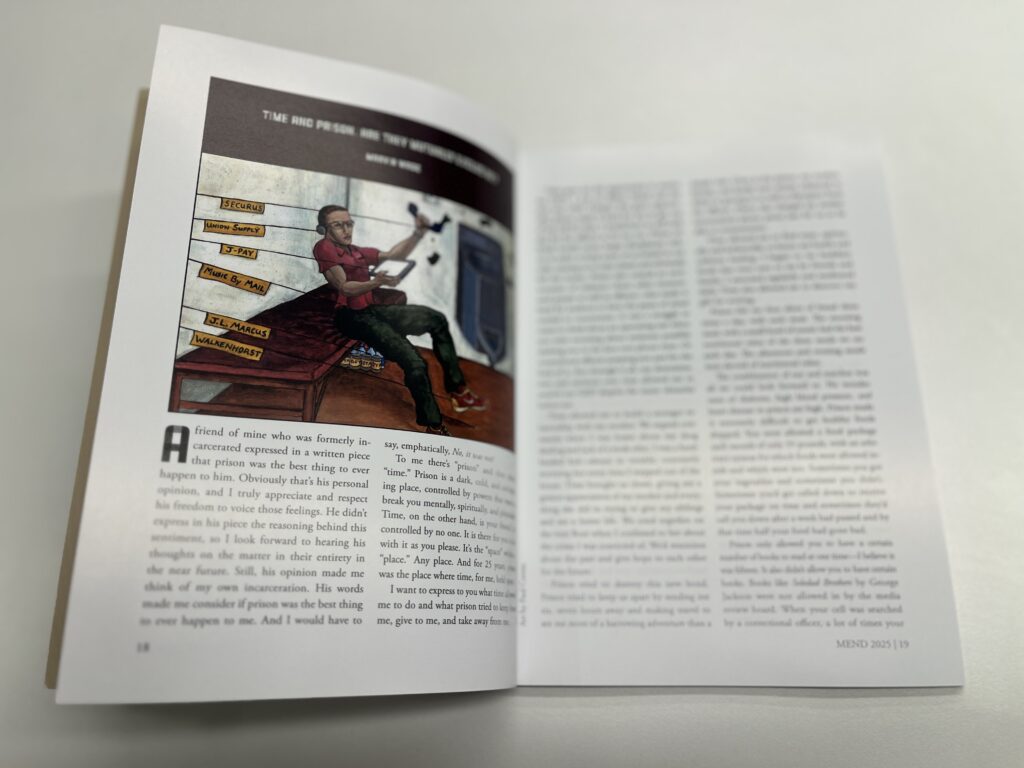A space that mends
A space that mends
“Project Mend” is a Syracuse-based program that offers people affected by incarceration a chance to find healing and community through storytelling.

Marvin Wade was the first person called into the Bronx Criminal Court for a gun charge he picked up two weeks earlier.
At the time, Wade was on the run. Although he knew he had committed a murder, he did not know that the police were actively looking for him. So he played it safe and waited for updates from his family to confirm whether he was a suspect.
After hearing nothing that suggested he was a wanted man, Wade appeared in court, expecting the earlier gun charges to be dismissed. He told his then-girlfriend to meet him afterwards.
The case was dismissed. But when he turned to leave the courthouse, he was stopped and handcuffed by detectives. As he was led toward a police car, he saw his girlfriend pulling up.
“I’ll be back,” Wade told her.
He did not know he’d be back 25 years later.
Now, Wade is a spiritual activist, writer and one of the featured voices of Project Mend, a Syracuse-based publishing initiative that brings together people impacted by incarceration through storytelling, advocacy and community engagement.
Founded and directed by Patrick Berry, an associate professor of Writing and Rhetoric at Syracuse University, the program also includes Mend Syracuse, an on-campus apprenticeship program where participants produce Mend, a national journal featuring work from those impacted by incarceration.
Wade’s essays “Getting Over The Mountain,” and “Time and Prison: Are They Mutually Exclusive?” are both featured in the journal.
“I want to change that stigma,” Wade said. “There are thousands of us out here doing work. I see so many good brothers and sisters doing good work and you don’t hear about it.”
At a Project Mend’s community engagement event at the Everson Museum of Art on June 6, Wade gave a reading of his essay, “Getting Over The Mountain.” Afterward, a young man named Ejarias “EJ” Burgin approached him, saying that he had cried only twice in his life.
“He said, ‘from reading the Bible and listening to your story,’” Wade said.
Burgin, who is the most recent member of Mend Syracuse, was released from prison just seven months ago. Before his incarceration, he was involved in gang activity, but said the program helped connect him with a diverse community.
“I’m not just speaking to the people in the hood,” Burgin said. “I’m also speaking to the people out in the country, people who are enrolled in school, mothers and fathers. People from all walks of life.”
Being a part of Project Mend introduced Burgin to positive role models and gave him a new perspective, helping him realize he doesn’t have to admire those involved in negative behaviors anymore.
“That doesn’t have to be my definition of success and fun anymore,” Burgin said. “It’s just really uplifting and empowering.”
Through his writing, Wade aims to connect with people, particularly young men, and inspire them to make informed and productive choices in life.
“For me, the best way I can reach out,” Wade said. “To help move the needle, move somebody.”
That impact extends into animation. Evan Bode, a filmmaker and instructor at Syracuse University, is collaborating with Project Mend to create an animated short film for Wade’s “Time and Prison: Are They Mutually Exclusive?” The piece covers Wade’s stance that prison did not make him a better man. Time gave him the chance to grow, while prison tried to hold him back.
Wade’s work resonated with Bode, especially the importance of the freedom to choose how to allocate your time.
“’Time and Prison’ makes a really compelling point about Marvin’s journey of growth and change in spite of prison, not because of his time in prison,” Bode said.
The animation, expected to be released by early September, aims to amplify Wade’s voice, who will narrate the animation, not overshadow it. Bode envisions the animation as a tribute to Wade’s work, explaining the importance of listening to marginalized voices.
“Incarceration is all about the denial of freedom,” Bode said. “When someone has had freedom denied, they have a deeper understanding of the power of self-expression through art, whether that’s through poetry, or writing or any other form.”
It was a couple of minutes until 6 p.m. when Syracuse resident Melinda Agnew, a Mend Syracuse apprentice, walked into Room 548 of the Mower Faculty Common inside Syracuse University’s Ernest Stevenson Bird Library. For around 14 weeks, the group gathers to read photocopied manuscripts and decides which will be published. She greeted her five peers already seated and said she had good news to share, but wanted to wait until more members arrived.
A couple of minutes past 6 p.m., there were nine members. That’s when Agnew decided to share.
“Monday Aug. 4, my lawyer called me and told me that my record is clean. So that means I don’t have a record when I go for a job. I don’t have to put down that I have a criminal past,” Agnew said. “I just tell them ‘no.’”
Instantly, everyone started clapping and cheering. Two voices interrupted the celebration to ask about the process of sealing a criminal record.
“When everyone clapped for me in that moment, they understood how tough my journey with a criminal record has impacted me,” Agnew said.
